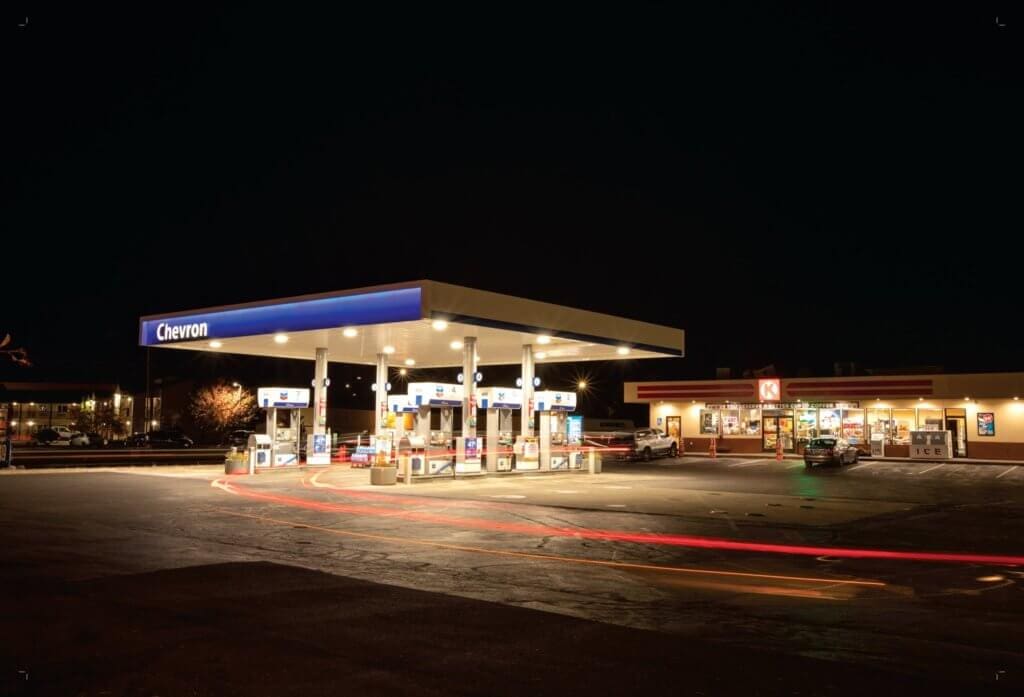Today, retailers have many options to sell branded fuel, such as Chevron, Shell, Texaco, Mobil, and others. Business owners may choose to sell branded fuel for many reasons:
- Consumers recognize and have loyalty to many fuel brands.
- Branded fuel companies provide marketing and promotional materials.
- Branded fuel companies often have established loyalty rewards programs, sometimes in conjunction with other popular retailers.
- Retailers with branded fuel agreements are given priority over other customers from fuel distributors–making it easier to get inventory during times of shortages.
- Branded fuels have proprietary blends that many consumers perceive as having greater value.
- The branded fuel supplier makes many decisions about facilities, such as signage, brand colors, interior layout, and canopy construction, all of which take burdens off the owner’s task list.
In exchange for these additional benefits, business owners are constrained by two significant factors:
- Branded fuel costs an average of 15 cents more per gallon than unbranded fuels. This additional cost goes to pay for the additional benefits.
- Retailers must comply with the terms and conditions provided by the branded fuel distributor with their agreement. In turn, the distributor commits to providing an ongoing supply of the branded fuel.
What happens if a retailer doesn’t comply with the branded fuel agreement?
Before 1978, business owners were exasperated when distributors arbitrarily terminated their contracts–forcing owners to switch to other branded franchise arrangements or become unbranded retailers. The Petroleum Marketing Practices Act (PMPA) was passed in 1978 and regulates what happens to a contractual relationship if either party fails to meet its obligations under the franchise agreement. PMPA only applies to fuel branded according to a refinery such as Chevron or Texaco. It does not apply to a franchise brand not affiliated with a specific manufacturer, such as “7-Eleven.” Other regulations oversee those types of franchise brands. Specifically, PMPA regulates the conditions under which a branded fuel franchise contract can be terminated or not renewed. In general, a branded fuel distributor can terminate an agreement or decide not to renew a contract with a retailer:
arrangements or become unbranded retailers. The Petroleum Marketing Practices Act (PMPA) was passed in 1978 and regulates what happens to a contractual relationship if either party fails to meet its obligations under the franchise agreement. PMPA only applies to fuel branded according to a refinery such as Chevron or Texaco. It does not apply to a franchise brand not affiliated with a specific manufacturer, such as “7-Eleven.” Other regulations oversee those types of franchise brands. Specifically, PMPA regulates the conditions under which a branded fuel franchise contract can be terminated or not renewed. In general, a branded fuel distributor can terminate an agreement or decide not to renew a contract with a retailer:
- For non-compliance with the terms of the franchise agreement,
- If the franchisee fails to carry out the terms of the franchise in good faith,
- By mutual agreement,
- If the supplier withdraws from the marketing area in which the retailer or distributor does business, or
- For certain other articulated reasons (15 USC section 2802).
Additionally, the rule has been updated since its adoption in 1978 to account for other situations such as protecting retailers that do not comply with illegal terms and to better coordinate with other applicable state and federal laws. Very importantly, the regulation states that breaches of provisions must be reasonable and of material, significance to warrant termination or non-renewal.
What does the Petroleum Marketing Practices Act mean for your business?
The Petroleum Marketing Practices Act provides business owners with the assurance that their contractual relationships with branded fuel distributors will be handled fairly. Their investment into branded fuel arrangements is secure as long as they fulfill their obligations to the contract. Our compliance experts at GP Energy can help you better understand the provisions of regulations such as the PMPA that impact your business.
If you’re considering moving to branded fuel, contact our team at GP Energy today.
Our professional team works with business owners like you to develop plans and strategies to achieve success. Whether you are hoping to expand your unbranded business by adding car wash facilities or expanded meal options, or you want to convert your business into a branded fuel facility, we have the expertise to guide you through the entire process. Our goal at GP Energy is to make crossing the finish line of goal achievement easily within your reach. Contact us today to get started!



